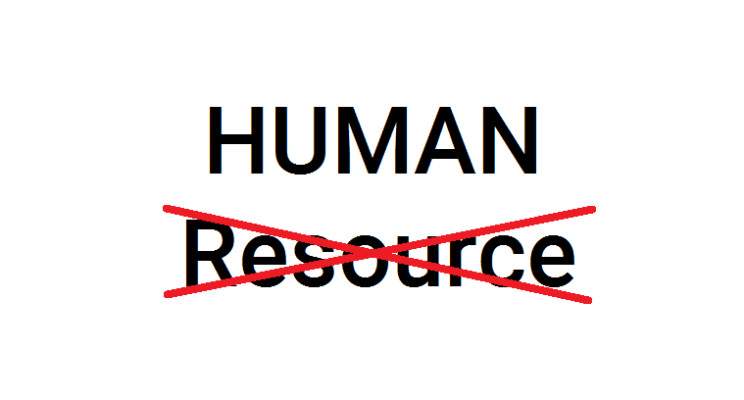
No, this is not a rant about HR departments. I’ve had great experiences dealing with HR professionals. Many of them do very difficult and complex jobs under increasingly challenging circumstances. Of course I’ve also dealt with some unbelievable dimwits who’d have difficulty finding the bathroom without a map, but that’s a different story. This is more of a commentary on how people are viewed in the context of project delivery.
Everyone you work with is a person with a rich, complex life.
You’ve probably often heard (especially if you live in a project/program/product delivery world) folks talking about how initiatives are to be resourced. I’ll bet you could, without straining much, replay some of those conversations, imagining that the resources they’re talking about are machines, or consumable items. They get allocated to a project and used until they’ve done what was needed, then moved on elsewhere. And at this point in the planning process, where they move to might be considered irrelevant, meaning they actually get disposed of as far as this project is concerned. Sounds familiar? This is a horrible way to even think about your fellow human being.
Everyone you work with is a person with a rich, complex life. At any given time, any one of them may be dealing with:
- Sick relatives, injured pets and other family upsets
- Car problems, or a difficult commute
- Mortgage re-arrangement, insurance renewals, financial worries, blah blah blah
- Health issues, marital problems, child-care arrangements, household repairs
- Just day-to-day life.
Consider for a moment a single person on your team. Let’s call that person Fred. Now think through Fred’s day so far. He got up and tripped over his cat on the way to the bathroom, where he showered. Made some coffee. Fed the cat. Had to iron a shirt quickly. Got dressed. Searched for his keys. Checked his wallet and phone. Headed out the door. Got to his car, realised he’d left his laptop behind. Back into the house, back out to the car, which was frosted over. Dealt with the frost and joined the morning rush-hour crawl into the city. Running a little late, so couldn’t get his favourite parking space in the multi-storey. But eventually he’s made it into the office and is ready to get today’s work started.
And this morning was a good morning. Nothing went wrong. The coffee-maker worked properly. There was hot water in the shower. The cat hadn’t pooped in Fred’s shoe. No family complications, no kids (who refuse to get dressed) to get through a school run. It wasn’t pouring with rain. The car started first time. No traffic jams. And so on. And I’ve just skimmed the surface of the hundreds or thousands of actions and interactions Fred went through before he even arrived at work.
Now at his desk, Fred gets the fun of dealing with an ever-increasing workload with an ever-dwindling work-force, irrationally irate customers and the occasionally inept colleague, at a company where he’s viewed as an output-capacity unit, and only constant seems to be change itself. Madness that way lies.
So what can we do about it?
It’s simple, really: put the people first. That’s part of the of the basics of my personal management philosophy.
Empathy and understanding are critical. Know that every single person you deal with has (quite literally) a whole world of other things going on in his or her life. Know that just because you pour coffee and a salary in, you’ll not always get a mass of high-quality output. People aren’t automatons. They don’t react well to being treated as such. They may not show (or even know) that they don’t react well. But I guarantee you’re not getting the best out of your team if you don’t appreciate them as people.
People aren’t automatons.
Grumpy
Get to know them a little better. No, you don’t need to be BFFs with everyone. But you do need a basic understanding of each individual and what their lives look like. If Fred has a small child who picked up that nasty ‘flu bug last week, Fred would probably really appreciate you taking a minute out of your day to ask if the child’s recovered (bonus points if you remember the kid’s name). Invest a moment in chit-chat about childhood diseases, the challenges of parenthood in the modern world, etc. Share some stories from your own experience. Apart from simply showing human interest and building a personal relationship, there’s a free business benefit: you’re collecting information that may be project-relevant: is Fred likely to need some time off or work-flexibility as a result? If so, how can you best manage that and mitigate any impact?
Is somebody on your team buying her first house? Let her know that you appreciate how stressful that process is. Offer moral support. Offer to share your own experiences. You don’t have to solve everyone’s problems (and in serious financial matters like this you shouldn’t try unless you’re qualified in that area), but you should be available to listen if they want to talk. Spending a few minutes with a sympathetic ear might be all she needs. It’s cost you nothing but a sliver of time, and made one of your team a little more comfortable.
It can’t be that easy!
I said it was simple. I didn’t say it was easy. And with some (fortunately very few) people, it’s not even possible. There will always be an individual or two that just refuses to connect with you on any kind of personal level. But for the majority, all it takes is a concerted and ongoing effort to understand and appreciate the myriad of non-work stressors that each person has to deal with day-to-day. Take it into account when you plan. Build a little stress-relief into the schedule somewhere. Be above all supportive and understanding.
When you see Fred (and if your name actually is Fred, I’m sorry!) behaving out-of-character, being more short-tempered or significantly less productive than usual, stop and think. If he doesn’t typically behave this way, what’s changed? Could it just be all about the pressure of work? Or is there something else going on in his life that is stressing him? If you’ve invested a little ongoing effort and got to know something about Fred the person, you’re much better equipped to understand and manage the situation. You’re better positioned to coach Fred out of this dip, and back to being a comfortable colleague. Or at least offer support and understanding through the process if it’s something you can’t otherwise influence.
Which is not to say you need to tolerate inappropriate behaviour or poor performance. It just means that you have a bigger toolkit to work with when repairing team issues. If Fred always behaves this badly, of course, that’s a completely different problem to deal with. But even then, some personal foundation of understanding would help.
It’s all about the People.
They are not resources to be expended on a project. They are people that you care about.
The postings on this site don’t necessarily represent the views or opinions of my employer, professional organisations, political party, family, car manufacturer or anybody at all, really. I don’t know where they come from. It scares me sometimes.


2 thoughts on “They’re not “resources”. They’re PEOPLE.”